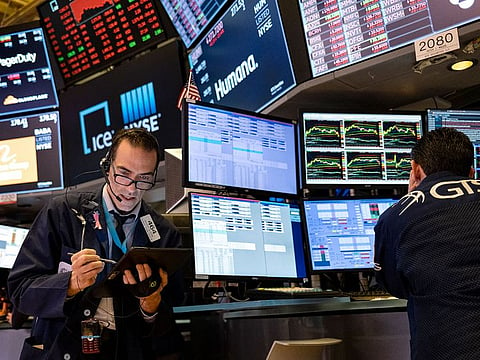Stock market crash: Why are US tech stocks falling, and what is behind the Bitcoin sell-off
Wall Street sell-off hits Asia, AI names retreat, and Bitcoin slips back under $100k

Dubai: Global equities fell sharply after a sell-off in major US technology names triggered a broader retreat in risk assets. Markets in Asia followed Wall Street lower, with Japan’s Nikkei tumbling more than 4% and South Korea’s Kospi sliding as much as 5%.
The S&P 500 dropped 1.2%, the Nasdaq fell 2% and futures pointed to further weakness. Shares of Nvidia, Microsoft and Palantir pulled back, with the latter falling almost 8% despite stronger-than-expected results.
Bitcoin fell below the $100,000 mark for the first time since June, before recovering modestly in early Asia trade. Ether and several smaller cryptocurrencies also dropped sharply.
Safe-haven buying lifted Treasuries and the yen, while oil prices weakened and gold steadied after a sharp fall earlier in the week.
Why markets fell
The pull-back is being driven by concerns that high-growth tech names have run too far, too fast. A narrow market led by a handful of AI-linked stocks has left valuations stretched and vulnerable to profit-taking.
Investors have become wary of earnings needing to do more to justify rich price levels after a strong run since April.
Caution from Federal Reserve policymakers added to the sell-off. Recent comments have stopped short of signalling further rate cuts, and the absence of key US data during the government shutdown has increased uncertainty around the policy path.
Corporate results remain in focus, but even beats from major names have not stemmed the broader sell-off. Companies including McDonald's, Expedia and Qualcomm are due to report later this week.
In cryptocurrencies, the reversal followed heavy liquidations in October that wiped out bullish positions. Bitcoin is now up less than 10% this year, trailing equities as ETF outflows and reduced institutional participation weigh on sentiment.
Investors are also hedging against further downside, with options positioning showing strong demand for strike levels around 80,000 dollars.
Where markets stand now
Asian markets are under pressure, with chip-sector names leading losses. South Korea briefly triggered a trading halt after futures fell more than 5%. Japanese technology stocks saw steep declines, including double-digit losses for some chip-equipment makers.
US futures point to another weak session. Bond yields are lower and the yen has strengthened as traders rotate toward defensive positions. Gold has stabilised following its steepest drop in more than a week.
Risk appetite remains fragile. Wall Street chiefs have warned a retreat is healthy after a record surge in AI-related stocks pushed valuations to levels associated with exuberance.
Bitcoin trimmed losses in early Asia trading, climbing back above 100,000 dollars, but traders remain cautious with funding costs and derivatives flows signalling limited appetite to re-enter aggressively.
Market participants are weighing whether this is a temporary correction after an extended rally or the start of a deeper reset in high-valuation sectors.
- With inputs from agencies.
Sign up for the Daily Briefing
Get the latest news and updates straight to your inbox



